Episodes
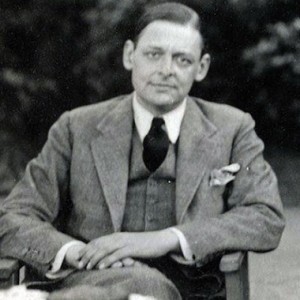
Tuesday May 14, 2019
T. S. Eliot and Life Beyond College with Dr. Glenn Arbery
Tuesday May 14, 2019
Tuesday May 14, 2019
In Wyoming Catholic College's humanities track, the last author our seniors read before graduation is poet T. S. Eliot.
While Geoffrey Chaucer in The Canterbury Tales extolled the loveliness of April when spring fills the earth with beauty and with great joy “people long to go on pilgrimages,” T. S. Eliot called April in our modern, secular age, “the cruelest month.” In his poem "The Waste Land," Eliot described the crowds of commuters with their backs turned to the glad pilgrim road to Canterbury as they slog into London for another work day.
Dr. Glenn Arbery, in addition to being our college president, has been teaching senior humanities. He is our guest this week on The After Dinner Scholar.
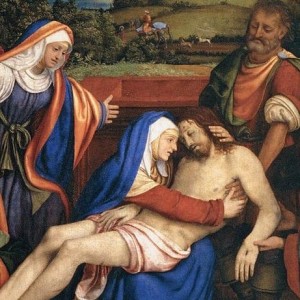
Tuesday May 07, 2019
Questions of Life and Death with Dr. Kent Lasnoski
Tuesday May 07, 2019
Tuesday May 07, 2019
In the old cowboy movie, "The Man Who Shot Liberty Valance," once Valance is on the ground with a bullet in him, someone calls for the doctor. The doctor turns the body face up with his boot, looks at the corpse, and says, "Dead." One hundred or more years ago, life and death were relatively simple, but they're not any more.
While there are good reasons to rejoice in modern medical technique and technology, questions of life and death have grow in number and complexity.
Dr. Kent Lasnoski ended his moral theology course with Wyoming Catholic College seniors by moving from the philosophical and the theological to the conundrums force on us by medical and biotechnical advancements. Dr. Lasnoski is our guest on this week's After Dinner Scholar.
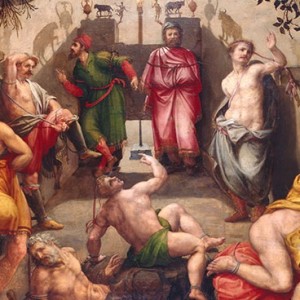
Tuesday Apr 30, 2019
Tuesday Apr 30, 2019
“Make an image of our nature in its education and want of education, likening it to a condition of the following kind” said Socrates in Plato’s dialogue The Republic. “See human beings as though they were in an underground cave-like dwelling with its entrance, a long one, open to the light across the whole width of the cave. They are in it from childhood with their legs and necks in bonds so that they are fixed, seeing only in front of them, unable because of the bond to turn their heads all the way around. Their light is from a fire burning far above and behind them. Between the fire and the prisoners there is a road above, along which see a wall, built like the partitions puppet-handlers set in front of the human beings and over which they show the puppets.”
The quote is the opening of Plato’s famous analogy of the cave. It’s an image of alienation and of exile from ourselves, from truth, from reality, and ultimately from God.
The analogy of the cave also serves as an introduction to all of Plato’s thought. And so our freshmen read it as the final work and capstone of their first year of humanities. Dr. Pavlos Papadopoulos, an expert on The Republic has been their teacher and is our guest on this edition of The After Dinner Scholar.
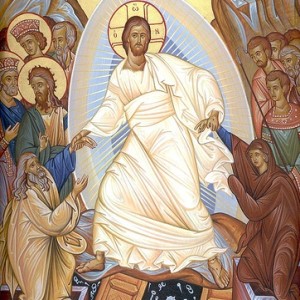
Tuesday Apr 23, 2019
St. Thomas Aquinas on the Resurrection of Jesus with Dr. Jeremy Holmes
Tuesday Apr 23, 2019
Tuesday Apr 23, 2019
The Catechism of the Catholic Church declares, “Easter is not simply one feast among others, but the ‘"Feast of feasts,’ the ‘Solemnity of solemnities,’ just as the Eucharist is the ‘Sacrament of sacraments’ (the Great Sacrament). St. Athanasius calls Easter ‘the Great Sunday’ and the Eastern Churches call Holy Week ‘the Great Week.’ The mystery of the Resurrection, in which Christ crushed death, permeates with its powerful energy our old time, until all is subjected to him.”
In his Compendium Theologiae, St. Thomas Aquinas reflected on the meaning of the resurrection. This Easter Week, Dr. Jeremy Holmes explains how Thomas understood the resurrection of Christ and its relationship to our resurrection.
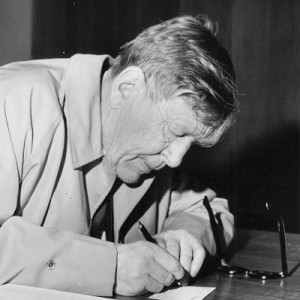
Tuesday Apr 16, 2019
The Grand Sweep of Western Civilization with Dr. Wilfred McClay
Tuesday Apr 16, 2019
Tuesday Apr 16, 2019
The one-semester undergraduate course's reading list included Augustine's Confessions, The Brothers Karamazov, Moby Dick, four Shakespeare plays, nine operas, and even more requiring about 6,000 pages of reading.
It was a course designed and taught by poet W. H. Auden at the University of Michigan in 1941. While the course is no longer one semester and the syllabus has undergone some revisions, the spirit of Auden lives on at the University of Oklahoma.
One of the professors behind the course is Dr. Wilfred McClay, the university's G. T. and Libby Blankenship Chair in the History of Liberty. Dr. McClay came to Wyoming Catholic College this past weekend to deliver a lecture and is our guest on this edition of The After Dinner Scholar.
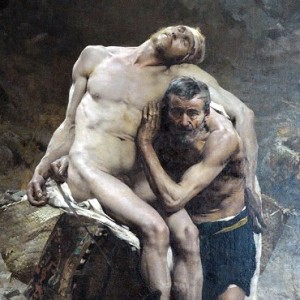
Tuesday Apr 09, 2019
"In an Urban Wilderness with Christ in the City" with Dr. Kent Lasnoski
Tuesday Apr 09, 2019
Tuesday Apr 09, 2019
March 23 to 30 was Outdoor Week here at Wyoming Catholic College. And while most of our students were out in what we typically think of as the wilderness, one group found themselves in another kind of wilderness: a wilderness of loneliness.
Christ in the City was founded in Denver to address long-term, chronic homelessness. Young missionaries commit one year to live in community, grow in the Faith, and minister to the needy, bridging the regrettable gap that often separates evangelism from service to the poor.
In addition, Christ in the City provides short-term opportunities during the summer and, for our Wyoming Catholic College students, during Outdoor Week.
Theologian Dr. Kent Lasnoski and his family were part of the team. Dr. Lasnoski is our guest this week on The After Dinner Scholar
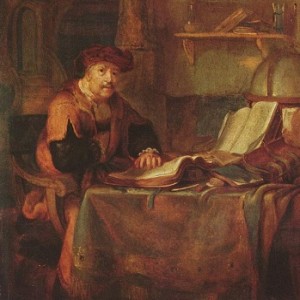
Tuesday Apr 02, 2019
Tuesday Apr 02, 2019
Two or three times each academic year two Wyoming Catholic College vans make the five-hour drive to Denver International Airport to pick up two dozen high school seniors to compete for one of our Founders’ Scholarships.
The Founders’ Scholarship is a full tuition scholarship awarded to a student who shows academic excellence, great work ethic and strong communication skills. The College holds two-three weekend-long competitions each academic year. Students tackle assigned readings ahead of time to discuss in seminars, prepare and deliver speeches, and interact with faculty, current students, and one another. In addition to being a competition, the Founders’ Weekend is a great taste of life at Wyoming Catholic College. Win, lose, or draw, most of the students leave having found a college they can love.
Dr. Jason Baxter, our academic dean, is a veteran of Founders’ competitions and is our guest on The After Dinner Scholar.
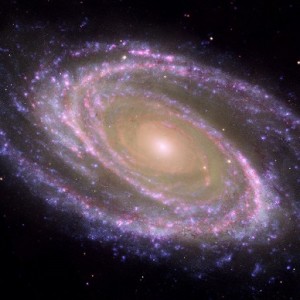
Tuesday Mar 26, 2019
How High the Moon, How Far the Stars? with Dr. Scott Olsson
Tuesday Mar 26, 2019
Tuesday Mar 26, 2019
A recent news article announced the discovery of 300,000 new galaxies bringing the number to somewhere around 100 billion some 12 to 18 billion light years away. Such numbers boggle the mind as does the notion that we can actually calculate such distances. Yet starting back in about 240 BC in Alexandria, Egypt Eratosthenes managed to calculate with amazing accuracy the circumference of the earth. Once that was done, it was only a matter of time before people calculated the distance to the Moon, to the Sun, and finally to the stars.
How did they do it? Dr. Scott Olsson has been discussing these matters with our Wyoming Catholic College sophomores. Dr. Olsson is our guest on this edition of The After Dinner Scholar.
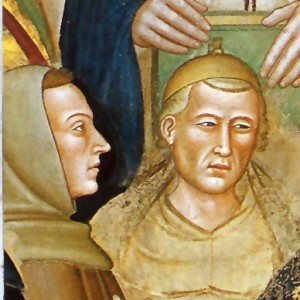
Tuesday Mar 19, 2019
Tuesday Mar 19, 2019
There are dozens of would-be explanations for the polarization we as a culture and body politic experience today. One plausible explanation we rarely hear about is nominalism as over against realism.
Do the words we use—“cat,” “canyon,” “mountain,” and most important “man”—describe universals or merely particulars? Can we meaningfully talk about human nature and what it means to be one of us? Is human nature something real that is outside of our thoughts or is it merely an internal, subjective construct we apply to many particulars that seem somewhat alike?
While these seem like rather abstract and academic question, Wyoming Catholic College senior Jack Thrippleton argued in his senior thesis and oration, “Realism and Nominalism cannot truly argue against each other, for they do not share enough premises.”
Jack is our guest this week on The After Dinner Scholar.
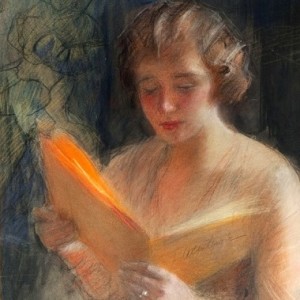
Tuesday Mar 12, 2019
Christian Fiction and the Rules of Subcreation with Mary Woods, Class of 2019
Tuesday Mar 12, 2019
Tuesday Mar 12, 2019
In the fall semester, Wyoming Catholic College seniors write theses and then in the spring semester all classes are canceled for three days as they present their research in the form of a public orations—thirty minutes of lecture followed by thirty minutes of question from a faculty panel and from their peers in the audience.
This and the next edition of The After Dinner Scholar will feature interviews with senior about their theses and orations.
Mary Woods is an aspiring novelist who entitled her thesis and oration “Law, the Soil of Story: Christian Fiction and the Rules of Subcreation.” Mary is our guest this week on The After Dinner Scholar.

